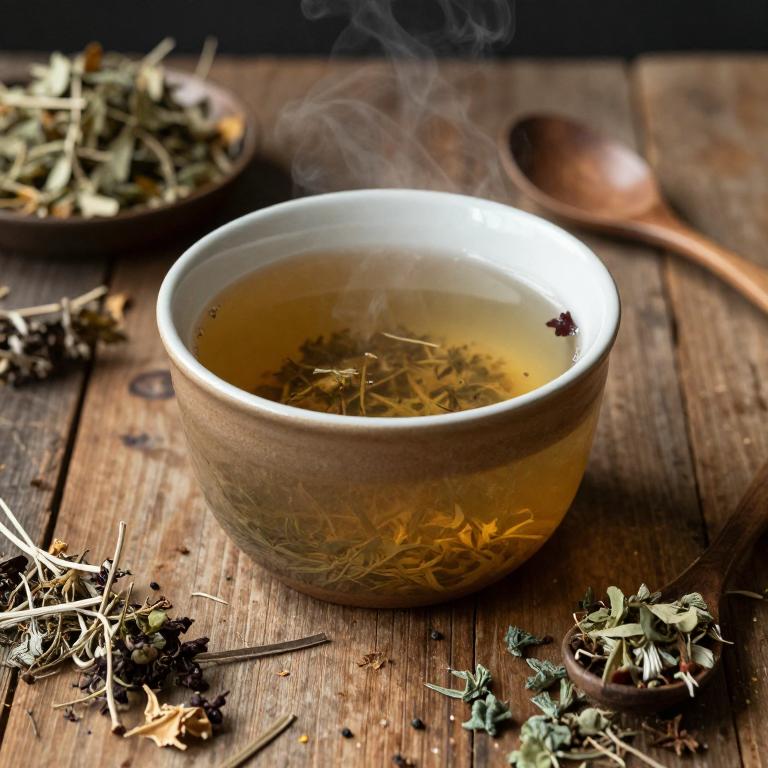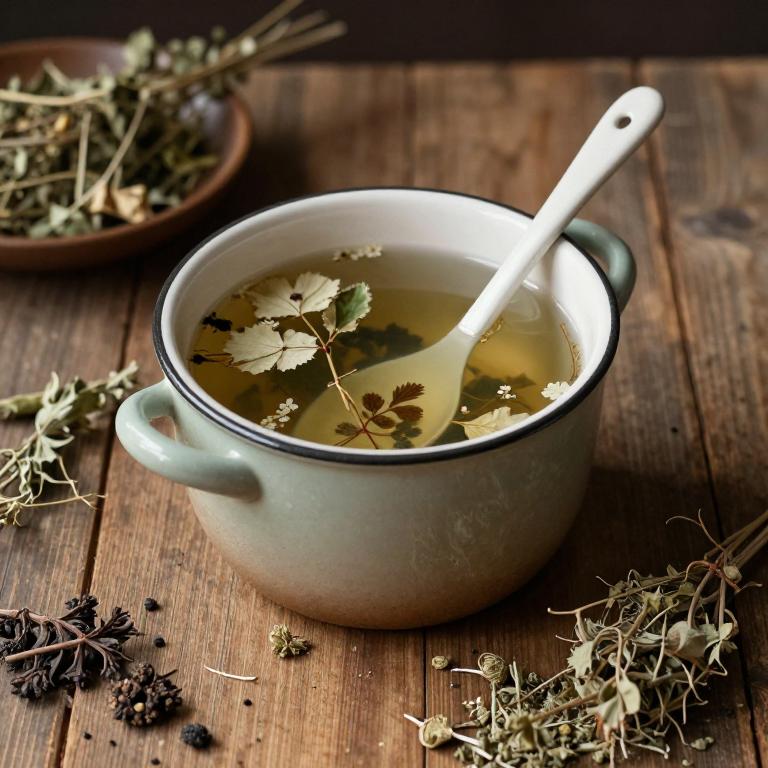10 Best Herbal Decoctions For Sinus Headache

Herbal decoctions have been traditionally used to alleviate symptoms of sinus headaches by promoting drainage and reducing inflammation in the nasal passages.
Commonly used herbs include eucalyptus, ginger, and peppermint, which are known for their decongestant and anti-inflammatory properties. To prepare a decoction, these herbs are typically simmered in water for several minutes to extract their active compounds. The steam from the decoction can help open up the nasal passages, while drinking the liquid may soothe the sinuses from within.
However, it is important to consult with a healthcare professional before using herbal remedies, especially for those with existing health conditions or who are taking medications.
Table of Contents
- 1. Ginger (Zingiber officinale)
- 2. Eucalyptus (Eucalyptus globulus)
- 3. Stinging nettle (Urtica dioica)
- 4. Black pepper (Piper nigrum)
- 5. Salvia (Salvia officinalis)
- 6. Rosemary (Rosmarinus officinalis)
- 7. Yarrow (Achillea millefolium)
- 8. Catnip (Nepeta cataria)
- 9. Peppermint (Mentha piperita)
- 10. Ceylon cinnamon (Cinnamomum verum)
1. Ginger (Zingiber officinale)

Zingiber officinale, commonly known as ginger, has been traditionally used in herbal medicine for its anti-inflammatory and analgesic properties.
When prepared as a decoction, ginger can help alleviate symptoms of sinus headaches by reducing inflammation in the nasal passages and sinuses. The active compounds in ginger, such as gingerol and shogaol, contribute to its effectiveness in easing pain and improving mucus flow. To prepare a ginger decoction, fresh ginger root is sliced and simmered in water for about 15 to 20 minutes.
While ginger can be a helpful complementary treatment for sinus headaches, it is advisable to consult a healthcare professional for persistent or severe symptoms.
2. Eucalyptus (Eucalyptus globulus)

Eucalyptus globulus, commonly known as the Tasmanian blue gum, is widely used in herbal decoctions to alleviate symptoms of sinus headaches.
The essential oils derived from its leaves, particularly eucalyptol, possess anti-inflammatory and decongestant properties that help reduce nasal congestion and sinus pressure. To prepare the decoction, fresh or dried leaves are simmered in water for several minutes, allowing the active compounds to infuse into the liquid. This herbal remedy is often used as a complementary therapy alongside conventional treatments for sinusitis and related headaches.
While generally safe, it is advisable to consult a healthcare professional before using eucalyptus globulus, especially for individuals with allergies or existing medical conditions.
3. Stinging nettle (Urtica dioica)

Urtica dioica, commonly known as stinging nettle, has been traditionally used in herbal medicine for its anti-inflammatory and analgesic properties.
When prepared as a decoction, it involves boiling the dried leaves and roots in water to extract its active compounds. This herbal remedy is believed to help alleviate symptoms of sinus headaches by reducing inflammation and improving mucus flow in the nasal passages. Some studies suggest that the compounds in stinging nettle may help reduce histamine levels, which can contribute to sinus congestion.
While it is generally considered safe, it is advisable to consult with a healthcare professional before using it, especially for individuals with allergies or those taking other medications.
4. Black pepper (Piper nigrum)

Piper nigrum, commonly known as black pepper, has been traditionally used in herbal medicine for its potential therapeutic effects on sinus headaches.
The active compound, piperine, is believed to possess anti-inflammatory and analgesic properties that may help reduce sinus inflammation and relieve headache symptoms. Herbal decoctions made from black pepper can be prepared by simmering the dried peppercorns in water, allowing the beneficial compounds to infuse into the liquid. These decoctions are often used as a complementary remedy to support respiratory health and alleviate pressure in the sinuses.
However, it is important to consult with a healthcare professional before using black pepper decoctions, especially for individuals with existing medical conditions or those taking medications.
5. Salvia (Salvia officinalis)

Salvia officinalis, commonly known as sage, has been traditionally used in herbal medicine for its potential therapeutic effects on various health conditions, including sinus headaches.
When prepared as a herbal decoction, sage can be boiled with water to extract its active compounds, such as flavonoids and essential oils, which may help reduce inflammation and congestion in the sinuses. The anti-inflammatory and decongestant properties of sage may provide relief from the pain and pressure associated with sinus headaches. Some studies suggest that sage may also have antimicrobial effects that could help prevent or alleviate sinus infections contributing to headaches.
While more research is needed to confirm its efficacy, many individuals find sage decoctions to be a natural and soothing option for managing symptoms of sinus headaches.
6. Rosemary (Rosmarinus officinalis)

Rosmarinus officinalis, commonly known as rosemary, has been traditionally used in herbal medicine for its potential benefits in alleviating sinus headaches.
When prepared as a decoction, rosemary's essential oils, particularly cineole and camphor, can help reduce inflammation and clear nasal passages, providing relief from congestion associated with sinus pressure. The warming properties of rosemary decoctions may also promote improved circulation, further easing the discomfort of a sinus headache. To prepare the decoction, fresh or dried rosemary leaves are simmered in water for about 15 to 20 minutes, then strained and consumed warm.
While rosemary is generally safe for most people, it is important to consult a healthcare provider before using it, especially for those with existing health conditions or who are pregnant.
7. Yarrow (Achillea millefolium)

Achillea millefolium, commonly known as yarrow, has been traditionally used in herbal medicine for its anti-inflammatory and antispasmodic properties.
Herbal decoctions made from dried yarrow leaves and flowers are often prepared by simmering the plant material in water for several minutes to extract its active compounds. These decoctions may help alleviate symptoms of sinus headaches by reducing nasal congestion and inflammation in the sinus passages. Some studies suggest that compounds in yarrow, such as flavonoids and essential oils, may have a mild analgesic effect.
However, it is important to consult with a healthcare professional before using yarrow decoctions, as they may interact with certain medications or cause allergic reactions in some individuals.
8. Catnip (Nepeta cataria)

Nepeta cataria, commonly known as catnip, has been traditionally used in herbal medicine for its potential soothing effects on the respiratory system.
A herbal decoction made from dried nepeta cataria leaves can be prepared by simmering them in water for several minutes, creating a calming tea. Some studies suggest that nepeta cataria may help alleviate symptoms of sinus headaches by reducing inflammation and promoting nasal decongestion. However, it is important to consult a healthcare professional before using catnip, especially for individuals with allergies or those taking other medications.
While anecdotal evidence supports its use, more scientific research is needed to fully understand its efficacy and safety for treating sinus headaches.
9. Peppermint (Mentha piperita)

Mentha piperita, commonly known as peppermint, has been traditionally used in herbal medicine for its potential benefits in alleviating sinus headache symptoms.
Peppermint herbal decoctions are prepared by steeping dried leaves in hot water, creating a soothing and aromatic infusion. The active compounds in peppermint, such as menthol and methyl salicylate, are believed to have decongestant and anti-inflammatory properties that may help reduce sinus pressure and pain. Some studies suggest that the aromatic compounds in peppermint can stimulate nasal airflow and provide relief from congestion associated with sinus headaches.
While peppermint decoctions are generally considered safe for most adults, individuals with certain medical conditions or those taking specific medications should consult a healthcare professional before use.
10. Ceylon cinnamon (Cinnamomum verum)

Cinnamomum verum, commonly known as true cinnamon, has been traditionally used in herbal medicine for its potential therapeutic effects on sinus headaches.
When prepared as a herbal decoction, it involves boiling the bark of the cinnamon tree in water to extract its active compounds, such as cinnamaldehyde and eugenol. These compounds possess anti-inflammatory and antimicrobial properties that may help reduce sinus inflammation and combat infections contributing to sinus headaches. The warm, aromatic steam from the decoction can also help open nasal passages and alleviate congestion.
While some studies suggest its potential benefits, it is important to consult a healthcare professional before using cinnamon decoctions as a treatment for sinus headaches, especially for individuals with allergies or chronic conditions.